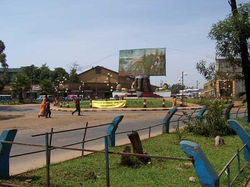visit jimma
 |  |  |  |
|---|---|---|---|
 |  |
visit jimma
The city of Jimma was established in 1830. It was founded by king Abba Jifaar the 1st. Abba Jifaar had ruled Jimma from 1830-1854. Since then Jimma has been named by the name “Jimma Abba Jifaar.”
Jimma is one of the oldest cities in Ethiopia. It is 184 years old. Its surrounding city Agaro is known for being the origin of coffee in the world. Further more the people have different skills such as making an artful cloth, metal work and wood works. Due to this skill full works and existence of coffee it has became the centre of trade both with in the country & in abroad. Jimma’s location is strategic. Because it is connected with the cities of south western part in all direction it is also the center of trade.
The society has long historical back ground which is glorious. However, the development of the city has been retarded until 1995 E.C. The city has got the right to administer itself by Oromiya regional state by decree no 65/1995(proclaimed in 2003). Then it has made reform on its organization and establishes other sector offices in addition to the municipality. The reform gave mandate to establish its own cabinets decide on its budget & exercise its power. Jimma has great potential for investment & tourism. Hence to inform the past & the existing situation of the city this profile has been prepared.
Mahbuba/bilile
The subject of this article is most often called ‘Mahbuba’ or ‘Machbuba’, which is an Arabic name that means ‘beloved’. She appears to have been given this name after being sold as a slave.
Elsewhere she is called 'Ajiamé' or 'Agiamé', which is also derived from the Arabic term ʿaǧamī.
But her birth name was probably 'Bilillee' or 'Birillee'.
Some details of Bilillee's early life are unclear, but it appears that she was born in the Kingdom of Gumma, in present-day Ethiopia. She was captured with her sister during local fighting, and, while still a child, taken by slave traders to Cairo. It was there in 1837 that she was purchased by Prince Hermann Ludwig Heinrich von Pückler-Muskau.
In a letter to his wife Lucie, Pückler-Muskau referred to Bilillee as his ‘mistress'. She was taken by him on his travels before returning to Germany with him in the Spring of 1840. She died in October that year, possibly from tuberculosis, at Muskau Castle in Saxony and buried in St. Jacobi Cemetery in the village of Bad Muskau.
Upon her death Pückler-Muskau wrote to a friend that Bilillee was ‘the being I loved most in all the world’.[4] A death mask was taken as well as a posthumous portrait. The portrait depicts her dressed in a 'Mamluk costume and positioned in front of a desert landscape with pyramids [and] is less a realist representation of her than a visual manifestation of Orientalist fantasies.